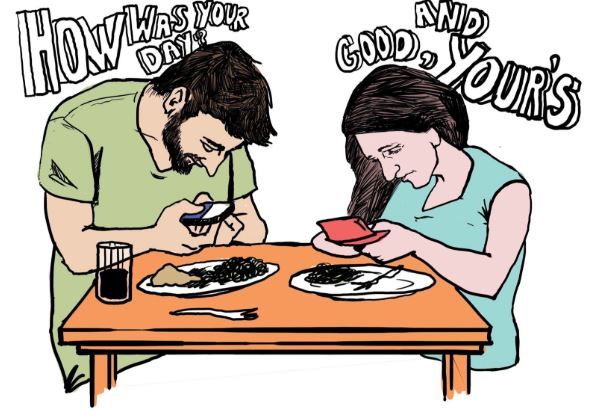Smartphone owners interact with their phones an average of 85 times a day. Along with the physical health implications we have a mental health epidemic waiting to happen.
Addiction is driven by the desire for reward! Our primary biological process for this is a neuro chemistry dopamine release , a hormone which kicks off in the brain just on the expectation of a reward, even more than the actual reward itself ! At high levels it brings euphoria.
Think of it in terms of a piece of cake. Looking forward to digging into a delicious cake when you are really, really hungry. Sugar and fat are high reward foods for the brain , so even the anticipation of seeing the cake will set off the release of dopamine.
We take the first bit and its ‘Heaven’ , the second bite is nice and by the time we’re half way through, dopamine levels in our brain are dropping off dramatically, already waiting for another stimulation.
So you finish the cake and don’t feel as good as when you started eating it. So, you have another piece . But the next piece is no where near as satisfying as the first, even if you are still hungry.
The brain no longer has the anticipation of the reward and doesn’t give you that same rush, but you’ll keep looking for it anyway.
Just as with alcohol, gambling, drug addiction and smoking. The initial hit is great, but the feeling drops off quickly, so you keep chasing the experience to get that dopamine high again.
Fortunately for us, our brain does not see ‘sitting’ as a reward, unless its after a very long walk or we’re tired!
Ok, so why is sitting being presented as being so bad. Our current interaction with the world through work and social life has turned us into static human beings, we are now socialising , working and ‘down timing’ through sitting on our phones and PC screens.
Sitting is just a symptom of screen addiction. Poor physical activity levels, leading to obesity, higher risk of heart diease and rising type 2 diabetes, starting at age groups from 8 yrs of age upwards.
Social media applications are designed to keep finding ways of bringing you back, as are games, news feeds and gambling sites. ‘This will make you feel good, do it again’. ‘I like you’, ‘I like your picture’, ‘I like your lunch’, ‘I like your new profile’, ‘quick look at this image before it disappears’ and the rewards are just waiting for you to go back in again and again, …
Ping, ping, ping.. Little dopamine hits every time.
Someone needs you, someone likes you and there’s the reward, and like a trained rat, when the rewards aren’t there and the dopamine levels drop. You keep checking in to see if there are any new messages, anymore funny images , anymore likes of your last post. If not, I’ll just change my profile picture or put up a picture of my coffee, that will get the kings of dopamine going again.
People claim they can put their phone down , but they can’t!
A couple of years ago I sat and watched a senior tech leader talk about being present and the poor habits of succumbing to the distraction of phone email and then she sat and looked into her phone for the next 15 minutes as the next presenter stood talking.
Facebook , Google , What’s Apps and others have lost, illegal sold, or shared our data and still we don’t stop using them.
Think about your own usage, have you had your phone out if your hand for more than a couple of hours today? Can you go through a day without it ? Can you decide I will not and do not need to be on my phone over the weekend, so I won’t pick it up until Monday?
I’m guessing the answers to all of these questions is, No.
This is the new 1950s epidemic, and as in the 1950’s smoking was not seen as addictive or dangerous.
Everyone does it, there’s no harm in it, it’s very socially acceptable. We can even drive and use them! Smartphone owners interact with their phones an average of 85 times a day, including immediately upon waking up, just before going to sleep, and even in the middle of the night. Along with the physical health implications we have a mental health epidemic waiting to happen.
It’s your screen that’s killing you , not the sitting.
We’ve regulated alcohol, smoking and gambling.. When will we start regulating phone applications in the same way?
Author : Stephen McDonald . Wellness Advisor, Physical Therapist and Corporate Speaker. Co-founder of ‘Onebody Pain & Movement Specialists’ clinic in Dublin : info@onebody.ie
References:Near a mobile and cogitation https://www.journals.uchicago.edu/doi/10.1086/6914…
Harmon, Ellie, and Melissa Mazmanian (2013), “Stories of the Smartphone in Everyday Discourse: Conflict, Tension and Instability,” in Proceedings of the SIGCHI Conference on Human Factors in Computing Systems, New York: ACM
Behave – The Biology of Humans our best and worst – Robert Sapolsky
The Chimp Paradox – Dr Steven Peters
Habits of Happy Brain – Loretta G. Breuning, PhD
Dscout (2016), “Mobile Touches: dscout’s Inaugural Study on Humans and Their Tech,”

